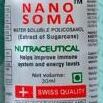Debunking Myths: What Research Says About the Efficacy of Policosanol for Cholesterol
In recent years, the popularity of alternative health supplements has surged, with many seeking natural ways to manage cholesterol levels. One such supplement that has gained attention is policosanol, a compound derived from the waxy coating of sugar cane and other plants. Promoted as a natural cholesterol-lowering agent, policosanol has garnered a dedicated following among health enthusiasts and natural remedy proponents. However, claims regarding its efficacy often blur the lines between fact and myth. This article delves into the research surrounding policosanol to clarify its role in cholesterol management.
Understanding Policosanol
Policosanol is a mixture of long-chain aliphatic alcohols, primarily derived from sugar cane wax. Its advocates suggest that it works by inhibiting cholesterol synthesis in the liver and increasing the clearance of LDL (low-density lipoprotein) cholesterol from the bloodstream. This dual action aligns with the desired outcomes for individuals looking to improve their lipid profiles, leading to the wider acceptance of policosanol as a natural alternative to statin medications.
The Claims: What Are People Saying?
Proponents of policosanol claim that it effectively reduces total cholesterol, LDL cholesterol, and triglycerides while raising HDL (high-density lipoprotein) cholesterol levels. Many anecdotal reports and some small-scale studies have painted a positive picture of its outcomes. Consequently, policosanol has garnered a reputation as a safe and effective option for managing cholesterol without the side effects commonly associated with pharmaceutical drugs.
The Research Landscape
Despite the enthusiastic marketing of policosanol, scientific research presents a more nuanced narrative. Early studies from the 1990s suggested a cholesterol-lowering effect, particularly in populations in Cuba, where the compound was first popularized. Some research indicated that policosanol could reduce LDL and total cholesterol while improving HDL levels. However, many of these studies were criticized for methodological flaws, including small sample sizes, lack of control groups, and potential conflicts of interest.
Recent meta-analyses and systematic reviews have further scrutinized the evidence supporting policosanol’s effectiveness. A noteworthy review published in 2015 analyzed multiple clinical trials and concluded that while some evidence suggested a modest reduction in cholesterol levels, the overall results were inconsistent. Many trials showed no significant difference when compared to placebo.
Potential Mechanisms of Action
While the mechanisms by which policosanol may influence cholesterol levels are still under research, some theorized functions include:
-
Inhibition of Cholesterol Synthesis: Policosanol is believed to hinder the activity of HMG-CoA reductase, an enzyme critical in the cholesterol biosynthesis pathway. However, concrete evidence demonstrating this inhibition in humans remains limited.
-
Improvement in Lipid Profiles: The increase in HDL cholesterol could support cardiovascular health. However, the clinical significance and long-term benefits of this change are still debated.
- Antioxidative Properties: Some studies suggest that policosanol possesses antioxidant properties that may positively affect cardiovascular health through mechanisms unrelated to cholesterol levels.
Addressing Common Myths
-
Myth: Policosanol is Superior to Statins: While statins are well-established medications for cholesterol management with a robust body of supportive research, policosanol lacks comparable evidence of efficacy. For those requiring significant cholesterol reduction, statins remain the gold standard.
-
Myth: Policosanol is Completely Side-Effect Free: Although generally regarded as safe, policosanol can exhibit side effects in some individuals, including digestive upset and allergic reactions. Additionally, it may interact with other medications, which raises the importance of consulting healthcare providers before initiating its use.
- Myth: All Policosanol Supplements are Equally Effective: The quality and concentration of policosanol can vary significantly across brands and formulations. This inconsistency amplifies the difficulty of assessing its effectiveness reliably.
Conclusion
While policosanol may offer some benefits for cholesterol management, the current research indicates that its efficacy is not as robust as many claims suggest. Individuals seeking to lower their cholesterol should rely on evidence-based methods, such as dietary changes, regular exercise, and medications as prescribed by healthcare professionals. Before adding any supplement to their regimen, consumers should engage in informed discussions with their doctors to navigate the tenuous landscape of cholesterol management effectively. In the realm of health supplements, it is crucial to separate myth from fact, ensuring that decisions are grounded in solid scientific understanding rather than popular belief.
